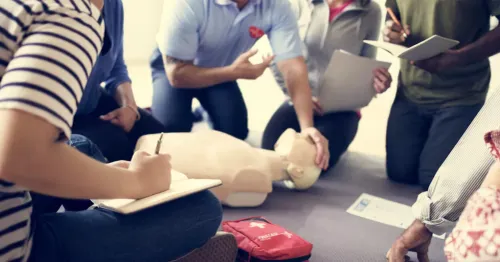Title: The Importance of First Aid Training for Drivers and Hotel Personnel
First Aid Training
In today’s fast-paced world, safety is a paramount concern, particularly in professions that interact with the public. Drivers and hotel personnel play critical roles in our daily lives, often serving as first responders in emergencies. Equipping them with first aid training not only empowers them to handle unforeseen situations effectively but also enhances the overall safety and well-being of communities. This essay explores the significance, benefits, and implementation of first aid training for drivers and hotel personnel.
Table of Contents
knowledge and skills necessary
First aid training equips individuals with the knowledge and skills necessary to respond promptly to accidents and health emergencies. For drivers and hotel personnel, who are often the first on the scene in emergencies, this training is particularly crucial. Drivers, whether they are taxi operators, bus drivers, or delivery personnel, are frequently exposed to road accidents. Similarly, hotel staff, including receptionists, housekeeping staff, and security personnel, regularly encounter guests who may suffer from medical issues ranging from minor injuries to severe health crises.
Benefits of First Aid Training
- Immediate Response to Emergencies
- First aid training enables drivers and hotel personnel to provide immediate assistance, potentially saving lives. In the critical moments following an accident or medical emergency, swift and appropriate first aid can prevent the situation from worsening.
- Enhanced Safety and Security
- The presence of trained individuals in hotels and on the roads increases the overall safety of these environments. Guests and passengers feel more secure knowing that trained personnel are available to assist in emergencies.
- Reduction of Accident Severity
- Proper first aid can minimize the severity of injuries and stabilize victims until professional medical help arrives. This is particularly important in road accidents where timely intervention can significantly reduce the impact of injuries.
- Increased Confidence and Morale
- First aid training boosts the confidence of drivers and hotel personnel, enabling them to perform their duties more effectively. Knowing that they can make a difference in emergencies enhances their job satisfaction and morale.
- Positive Public Perception
- Organizations that prioritize first aid training are viewed more favorably by the public. This positive perception can enhance customer loyalty and trust in the services provided.
The management of common
- Basic Life Support (BLS)
- Training in BLS, including cardiopulmonary resuscitation (CPR) and the use of automated external defibrillators (AEDs), is essential. These skills are vital in situations where individuals are unresponsive or not breathing.
- Management of Common Injuries
- Training should cover the management of common injuries such as cuts, burns, fractures, and sprains. Understanding how to properly dress wounds, apply splints, and manage burns can prevent complications.
- Handling Medical Emergencies
- Hotel personnel and drivers should be trained to recognize and respond to medical emergencies like heart attacks, strokes, and allergic reactions. This includes understanding the signs and symptoms and knowing how to administer appropriate first aid.
- Emergency Evacuation Procedures
- In both hotels and vehicles, knowing how to safely evacuate individuals in an emergency is critical. Training should include procedures for evacuating buildings and vehicles, particularly in the event of fires or other hazardous situations.
Implementation of First Aid Training Programs
- Collaboration with Medical Professionals
- Partnering with medical professionals and certified first aid trainers ensures that the training is comprehensive and up-to-date with the latest medical guidelines and best practices.
- Regular Training and Refresher Courses
- Regular refresher courses are necessary to keep the skills of drivers and hotel personnel sharp and to update them on new techniques and protocols.
- Simulation-Based Training
- Incorporating simulation-based training can enhance the learning experience. Realistic scenarios help trainees practice their skills in a controlled environment, better preparing them for real-life situations.
- Accessible Training Resources
- Providing easy access to training materials and resources, such as online courses and instructional videos, can supplement in-person training and allow for continuous learning.
- Encouragement and Incentives
- Encouraging participation through incentives, such as certifications, rewards, or recognition programs, can motivate staff to engage actively in first aid training programs.
Case Studies and Success Stories
- Transportation Sector
- In several countries, mandatory first aid training for commercial drivers has led to a noticeable decrease in fatalities and severe injuries from road accidents. For instance, a study in Sweden found that drivers trained in first aid were able to reduce the time to initial care by up to 50%, significantly improving outcomes for accident victims.
- Hospitality Industry
- Hotels that have implemented comprehensive first aid training programs report higher guest satisfaction and safety ratings. In a notable case, a hotel in Singapore credited its trained staff with saving the life of a guest who suffered a cardiac arrest by administering CPR and using an AED before paramedics arrived.
Conclusion
First aid training for drivers and hotel personnel is not merely a beneficial addition to their skill set; it is a vital component of public safety. The ability to respond effectively in emergencies can save lives, reduce injury severity, and enhance the overall safety of our communities. By investing in regular, comprehensive first aid training programs, organizations can ensure that their staff are prepared to handle emergencies with confidence and competence. The long-term benefits of such training, from improved safety records to increased public trust, make it an indispensable aspect of professional development in these critical sectors.








